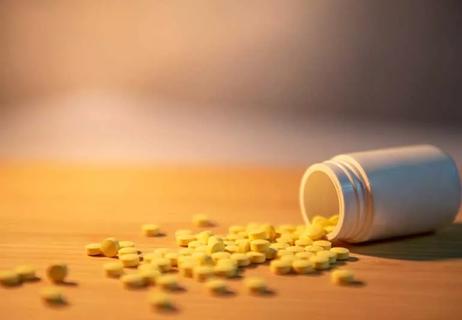When you’re dependent on a substance, your body relies on it to function; when you’re addicted to a substance, you continue to use it despite negative consequences

Most people seem to use the words “dependence” and “addiction” interchangeably. But do they really mean the same thing? We spoke to substance use disorder specialist David Streem, MD, to get a better understanding.
Advertisement
Cleveland Clinic is a non-profit academic medical center. Advertising on our site helps support our mission. We do not endorse non-Cleveland Clinic products or services. Policy
Dependence and addiction are nuanced concepts that can’t easily be boiled down to the basics. But for the sake of understanding the differences between them, here’s a look at both in extremely simplified terms:
You’ll often hear people (including those in the medical community) use these terms interchangeably. There’s a lot of overlap between the two — but not everyone who is chemically dependent has an addiction, and not everyone with addiction is chemically dependent.
When you’re dependent on a substance, your body relies on it to function. If you suddenly stop taking it, you’ll experience physical and physiological changes, like symptoms of withdrawal.
But here’s where it can get tricky: You can be dependent on a substance you need for your health. And that’s not a bad thing.
“The word ‘dependent’ sometimes leads people to worry that they should stop using medications that they need to function every day,” Dr. Streem notes. “But people with diabetes need insulin, people with emphysema need oxygen, people with hypertension need blood pressure medicine, and so on. None of these are addictive.”
Advertisement
But sometimes, dependence can turn into addiction.
Imagine two people who were both badly injured in car accidents. To help them manage their pain and the surgeries they need, their providers prescribe opioids.
In time, as both heal from their injuries, their bodies have become dependent on the medication. One person follows their provider’s guidance to safely stop the medication, and soon, they no longer need it. They’re not dependent on the substance anymore.
The other person has become dependent on the medication, too — but they have also become addicted to it. Unable to follow their provider’s guidance for stopping the medication, they now seek illegal ways to acquire the drug so they can keep taking it. In this case, this person’s dependence has become opioid use disorder, another term for addiction.
Two people, once dependent on the same medication, have taken very different paths. So, what exactly is addiction, and why does it happen to some people but not others? Let’s take a look.
When you have an addiction to a substance, you continue to take or use that substance despite the harmful effects it’s having on your life.
“With addiction, people experience a loss of control over the use of the substance,” Dr. Streem explains. “Then, when there are consequences related to their substance use — whether related to their family, health, career or the law — they can’t change their behavior based on those consequences.”
Of course, not everyone who drinks or tries a drug becomes addicted to it. Some people safely end their dependence on a medication without developing an addiction. And some addictions aren’t substance-related at all: Gambling disorder, for example, is a behavioral problem that has a lot of similarities to substance addiction.
So, why does addiction happen to some people and not others? What’s the common factor?
“Addiction is a brain disorder,” Dr. Streem clarifies. “It’s part of a group of brain disorders that lead people to continue to do things over and over and over again. Even though they know it’s not healthy or in their best interest, they can’t stop.”
For people with addiction, using certain substances or engaging in certain behaviors stimulates the brain’s so-called reward center, releasing a chemical messenger called dopamine that signifies pleasure. But your brain doesn’t know how to deal with so much dopamine, so it copes by lowering its sensitivity.
“That means that over time, the substance is the only thing capable of stimulating that reward center,” Dr. Streem continues. “That means nothing else is important anymore — a new baby, a job well done, a beautiful sunrise, a great workout, all of the things that used to bring pleasure. Instead, the only important thing is getting the drug again.”
Advertisement
Behavioral addictions, like gambling, don’t have a dependency component. But chemical dependencies can turn into addiction, like to:
Let’s say you really want to stop smoking cigarettes. You know they’re harming your health, and the cost is hurting your wallet. Plus, it’s caused countless arguments with your spouse, but you just can’t seem to give up smoking.
This is an example of a chemical dependency (in this case, to nicotine) that is also an addiction. Despite the consequences that your nicotine use is having on your health, finances and relationship, you continue to engage in the behavior.
So, yes, dependence and addiction can overlap in a lot of ways. But in general, when it comes to addictive drug and alcohol use, medical professionals now mostly use one umbrella term: “substance use disorder.”
“We always want to use language that’s not stigmatizing, disempowering or shaming,” Dr. Streem stresses. “And the key thing is always to help people understand what’s happening inside their brains and how they can get things back on track.”
Advertisement
It can be hard to acknowledge that you’re living with substance use disorder. But if drug or alcohol use has started to negatively affect other aspects of your life, like your relationships, job, health or finances, it’s time to seek treatment.
Start by talking to a healthcare provider. They can help steer you to the right resources, like rehabilitation, therapy, support groups and more.
“We don’t have a person to waste in this world,” Dr. Streem emphasizes. “So, when someone is living with substance use disorder, it’s important that we get them the help they need so they can have an opportunity to fulfill their potential.”
Asking for help can be a difficult step — but it’s the first step to a healthier future.
Advertisement
Learn more about our editorial process.
Advertisement

Genetics may increase your risk of a substance use disorder, but that doesn’t mean it’s fated

Maintaining hope and positive behavior during a pandemic

It isn’t a recognized mental health disorder, but research shows that problematic social media use can negatively affect your mental health, self-esteem and sleep

Instead of trying to get rid of dopamine, focus on stepping away from habits and behaviors that no longer serve you

Signs you’re a compulsive spender include lying about purchases, buying things you don’t use and treating shopping like a hobby

Being hooked on love can cause unhealthy relationship patterns and obsessive thoughts

Sneaking off or turning down social activities to exercise might be signs of an addiction

You must act fast to save a life

Wearing a scarf, adjusting your outdoor activities and following your asthma treatment plan can help limit breathing problems

Your diet in the weeks, days and hours ahead of your race can power you to the finish line

When someone guilt trips you, they’re using emotionally manipulative behavior to try to get you to act a certain way